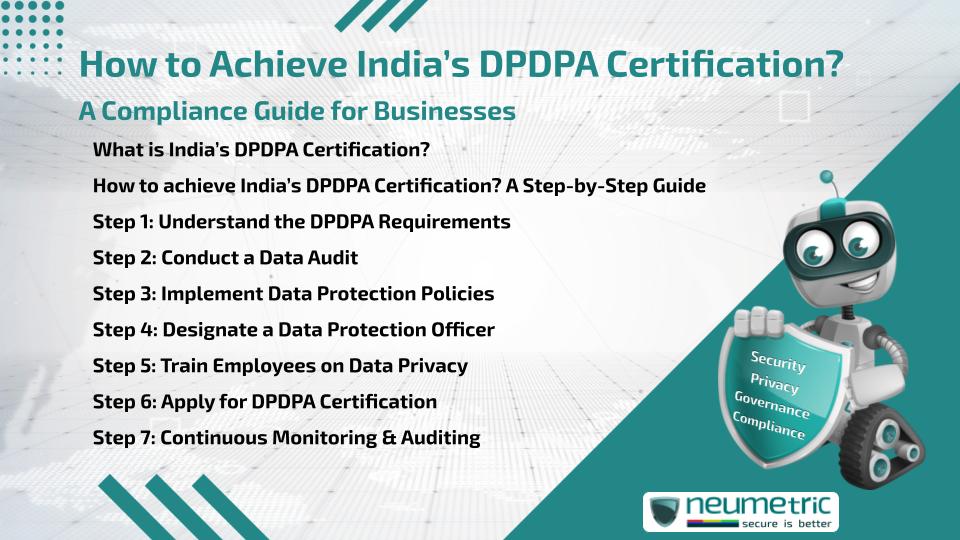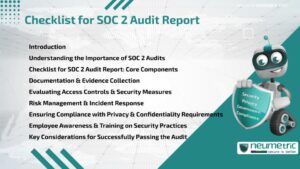Table of Contents
ToggleIntroduction
India’s Data Protection laws are undergoing significant changes with the introduction of the Data Protection & Privacy Act [DPDPA]. This regulation aims to secure the Personal Data of Indian citizens & establish a framework for Data Processing, ensuring Privacy & Accountability in the Digital Age. As businesses across the Country adapt to these new requirements, How to achieve Indian DPDPA Certification? becomes a key concern for Compliance.
This Article will guide you through the Process of obtaining the DPDPA Certification, explaining the steps involved, the Benefits & the Challenges you may face. Whether you are a small Business owner or part of a large Enterprise, understanding this Certification Process is crucial for ensuring Compliance with India’s Data Protection laws.
What is India’s DPDPA Certification?
The DPDPA Certification ensures that businesses adhere to the Standards set by India’s Data Protection & Privacy Act. This Certification is a mark of Compliance, confirming that an organisation has implemented Robust Systems to manage & protect Personal Data.
In essence, How to achieve India’s DPDPA Certification? involves demonstrating your commitment to Data Protection by meeting certain Regulatory Standards. These Standards are Designed to protect the Privacy of individuals while enabling businesses to Process Data responsibly.
Why is DPDPA Certification Important?
With Data Breaches & Privacy concerns becoming increasingly common, Data Protection Certification can help businesses build trust with their Customers & Partners. Achieving DPDPA Certification shows that your organisation respects Privacy & is taking the necessary steps to ensure the Safety & Confidentiality of Personal Information.
Additionally, it helps organisations avoid Penalties for Non-compliance. As Data Privacy regulations become more stringent, businesses that fail to comply could face significant Fines & Reputational damage.
How to achieve India’s DPDPA Certification? A Step-by-Step Guide
Achieving India’s DPDPA Certification is a structured Process. Below are the Key Steps organisations should follow to comply with the Regulations & obtain the Certification.
Step 1: Understand the DPDPA Requirements
The first step in How to achieve India’s DPDPA Certification? is understanding the Legal requirements of the Act. The DPDPA lays out specific Guidelines for Data Processing, Data Subject rights & the responsibilities of businesses. These Guidelines cover areas such as:
- Data collection & Processing: Guidelines on how Data can be Collected, Stored & Used.
- Data subject rights: Providing individuals with Control over their Data, including Rights to Access, Correction & Deletion.
- Data Security: Implementing measures to Protect Data from unauthorised Access, Loss or Theft.
Having a thorough understanding of these Regulations is essential before proceeding to the next Steps of the Certification Process.
Step 2: Conduct a Data Audit
Once you understand the requirements, the next Step is to conduct a Data Audit. This involves reviewing how your organisation Collects, Stores, Processes & shares Personal Data. The Audit helps identify Potential Risks & areas where your practices may not align with DPDPA Standards.
A Data Audit typically includes:
- Mapping out the Data flow within your organisation
- Reviewing existing Data Protection measures
- Identifying areas of Non-compliance or Gaps in Data Security
The Audit will provide a baseline for the changes you need to make in Order to Comply with the DPDPA.
Step 3: Implement Data Protection Policies
After completing the Data Audit, it’s time to implement the necessary Data Protection Policies. This is where you put in place the Practices & Procedures to ensure Compliance with the DPDPA.
Some common Practices include:
- Data encryption: Encrypt sensitive Data to protect it during Storage & Transmission.
- Access control: Restrict access to Personal Data only to Authorised Personnel.
- Data retention Policies: Set clear Guidelines for how long Data is Retained & when it should be Deleted.
These Policies need to be Comprehensive & in line with DPDPA requirements.
Step 4: Designate a Data Protection Officer
A crucial requirement of the DPDPA is the Appointment of a Data Protection Officer [DPO]. The DPO is responsible for overseeing Data Protection efforts, ensuring Compliance with the law & serving as the Point of Contact for Data Subjects & Regulatory Authorities.
The DPO should have a strong understanding of Data Protection laws & be empowered to make decisions regarding the organisation’s Data Privacy practices.
Step 5: Train Employees on Data Privacy
Achieving How to achieve India’s DPDPA Certification? also involves Educating your staff on the importance of Data Protection. Data Privacy Training should be mandatory for all Employees, especially those who handle Personal Data regularly.
Training programs should cover:
- The basics of the DPDPA & its requirements
- How to handle Personal Data responsibly
- What to do in case of a Data Breach
Employees should also be made aware of the consequences of Non-compliance, both for the organisation & for themselves.
Step 6: Apply for DPDPA Certification
After implementing the necessary Policies & Processes, you can apply for DPDPA Certification. This Process typically involves submitting your Data Protection Policies & practices to an Accredited Certification body, which will Review your Compliance with the DPDPA.
Once the Certification body confirms that your organisation meets all necessary Standards, you will be granted Certification.
Step 7: Continuous Monitoring & Auditing
Achieving Certification is not the end of the Process. The DPDPA requires businesses to engage in Continuous Monitoring of their Data Protection practices. Regular Audits & Assessments are necessary to ensure ongoing Compliance with the law.
Organizations must also stay updated on any changes in Data Protection laws & adjust their practices accordingly to remain Certified.
Benefits of DPDPA Certification
Enhanced Trust & Reputation
Achieving How to achieve India’s DPDPA Certification? shows your Customers, Partners & stakeholders that you are committed to protecting their Personal Data. This can lead to increased trust & a stronger Reputation, which can Ultimately translate into business Growth.
Legal Compliance
By achieving DPDPA Certification, you ensure that your business is compliant with Indian Data Protection laws, helping you avoid hefty Fines & Legal consequences for Non-compliance.
Competitive Advantage
As Data Privacy becomes a priority for businesses & Consumers alike, being DPDPA-certified can give you a Competitive edge. It can make your Services more appealing to clients who are concerned about Data Security & Privacy.
Challenges of achieving DPDPA Certification
While the benefits of DPDPA Certification are clear, the Process can be challenging. Some common hurdles businesses face include:
- Resource Allocation: The Process of conducting Data Audits, implementing Policies & Training employees requires Time & Resources.
- Complexity of Regulations: The DPDPA is detailed & can be difficult to navigate, especially for smaller businesses without dedicated Legal or Compliance teams.
- Cost: The Certification Process, including Audits & Consultations, can incur Costs, which may be a Barrier for smaller organisations.
Conclusion
Achieving India’s DPDPA Certification is a crucial Step for businesses that want to demonstrate their Commitment to Data Protection & Privacy. By following the Steps outlined in this Guide, organisations can navigate the Certification Process with Confidence & ensure Compliance with one of the most important Regulatory Frameworks in India.
Takeaways
- How to achieve India’s DPDPA Certification? involves Understanding the Law, conducting Audits, implementing Policies & ensuring ongoing Compliance.
- The Certification enhances Trust, ensures Legal Compliance & provides a Competitive edge.
- Challenges in the Process include Resource allocation, Regulatory complexity & Costs.
FAQ
What is India’s DPDPA Certification?
India’s DPDPA Certification verifies that an organisation Complies with the Data Protection & Privacy Act [DPDPA], ensuring the Protection of Personal Data.
Why is DPDPA Certification important?
DPDPA Certification is important for building Trust with Customers, ensuring Legal Compliance & gaining a Competitive Advantage by demonstrating a Commitment to Data Protection.
How long does it take to achieve DPDPA Certification?
The time it takes to achieve DPDPA Certification varies depending on the Complexity of an organisation’s Data Practices, but it typically takes Several months to complete the Certification Process.
Can small businesses achieve DPDPA Certification?
Yes, small businesses can achieve DPDPA Certification by following the same Steps as larger organisations, though they may face Challenges due to limited Resources.





